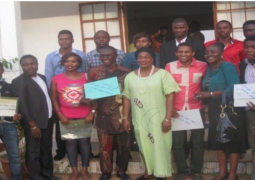The Pro-Poor Advocacy Group, Pro-PAG, was brought to the Industrial Tribunal on 29 February 2012 by one John Charles Njie, plaintiff, who is a former employee of Pro-PAG, the defendant.
The plaintiff’s claim against the defendant is for a declaration that the termination of the plaintiff’s employment by the defendant is unlawful.
John Charles Njie is also claiming for the sum of D372, 015 being damages for the unlawful termination or unfair dismissal of the plaintiff.
The plaintiff’s claim further indicates the sum of D500, 000 being damages for breach of contract.
The sum of D104, 025 has been also claimed by the plaintiff being three months leave arrears for the years 2008 to 2010.
John Charles Njie would further claimed for the sum of D124, 005 being salary arrears for the month of June, July and August 2011.
Interest at the rate of 30 percent per annum from 1 September 2011, to date of judgment and thereafter at the rate of 4 percent to date of payment, as well as costs.
When the case was mentioned, state counsel Kulo, who is the Director of Special Litigation, rose and told the tribunal that he was representing the defendant.
Lawyer Mendy, counsel for the plaintiff, stood and told the tribunal that she was opposing the representation by the state counsel.
She stated that the defendant has nothing to do with governmental matters, and that the representative has no locus in the case.
Director of Special Litigation then argued that his appearance to defend the defendant was proper in law.
He said every litigant appearing before a court of law in The Gambia has the right to choose any counsel to appear on his behalf to conduct his case.
He added that the government of The Gambia was by implication a party to the case, and ought to be joined as co-defendant.
He cited the particulars of claim of the plaintiff.
“If at all there was a breach of contract, it is the right of the defendant to choose any counsel to represent it, be it a private counsel or state counsel,” he further argued.
He cited the NGO Act to support his argument, and stated that this Act has supervisory role over the activity of the defendant.
He said the government has interest in the case.
Lawyer Mendy again rose, and said that the state counsel should apply as a party to the case.
State counsel Kulo then said the Act has a protocol of accord between government and NGO which also gives supervisory powers to state counsel.
Lawyer Mendy further submitted that the authority cited by the state counsel was not applicable.
“The state counsel is a member of the official bar, and can only deal with matters where the state is a party,” lawyer Mendy argued.
She further referred to the Act earlier cited by the state counsel, and argued that it relates mainly to the management of an NGO within the jurisdiction.
“Supervisory does not mean representation. I submit that these provisions are irrelevant, and should be disregarded,” she told the court.
The matter was adjourned to 2nd, 9th and 16th May 2012 for ruling and hearing.
Read Other Articles In Article (Archive)
Region 5 teachers, cluster monitors sensitised on H1N1 Pandemic
Dec 14, 2010, 1:44 PM




